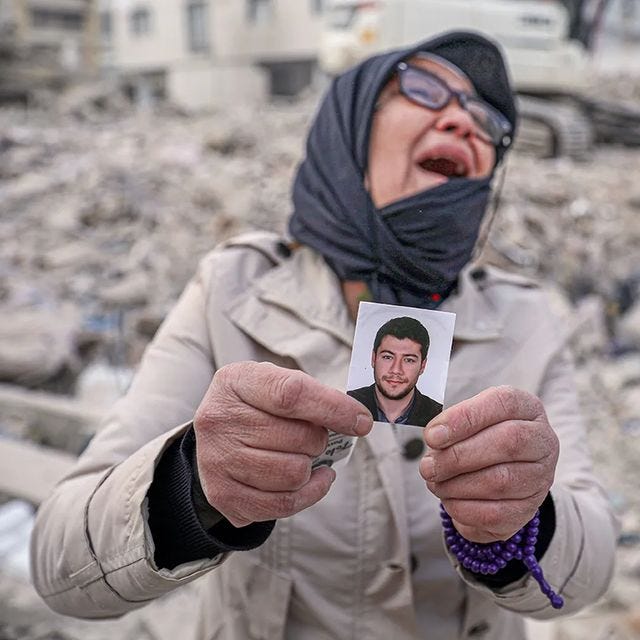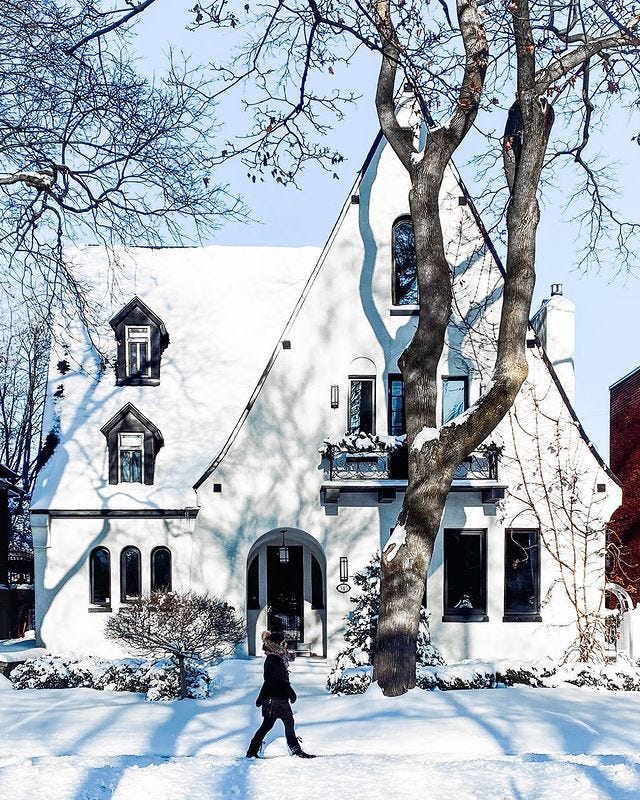In the days that came after the earthquake, I kept wondering how anyone could think about anything else.
I knew how, logically. Life goes on. People have kids to look after and their own grief and hardships. Suffering doesn’t come in a limited supply—in fact, lately, there seems to be extra going around.
But still.
Like many other people in other parts of Turkey, I flailed around trying to help. To raise money, to find the best places to donate that money, to share as much information as I could. I raged when I learned that supplies were not being distributed properly. I raged when found out that tents had been set up without any bedding or heat or food. I raged when I learned about the earthquake tax that’s helped no one, and how, impossibly things are even worse in Syria. I felt heavy with helplessness and guilt.
My friend Saskia wrote,
“I am exhausted from thinking about my own powerlessness, my own inability to make any kind of difference. I am panicking and trying to figure out how to be anything but completely useless… I lay there and imagine all of those people sleeping in tents, on the streets, next to fires, surrounded by a crumbling world.”
In the days, weeks and months before the earthquake, I’d become a bit cynical.
I am not proud of this. It’s a thing I’d noticed in my fellow yabanci, and vowed not to let it happen to me. But there I was, getting irritated about how people drive in Fethiye, worrying about the rising prices of things I can still afford, complaining about the incredible maze of bureaucracy that is Turkey.
Now, as I prepared to fly back to my home country for the first time in 18 months, I walked around, buying Turkish Delights and soap for friends, and found myself in the headspace I used to have when I visited, and when I first arrived—basking in smell of burning charcoal and the spices spread out on tables in the streets; smiling at the shopkeepers smoking in doorways, watching passersby; bathing in the beauty of this place, its relaxed chaos, the friendliness of its people.
As the poet and I waited to pick up food at a local lokanta, it felt like everyone was softer, letting each other go first in line, not honking their horns quite as much. There was a sense of collective grief, and collective care. The poet showed me the now-famous photo of the man holding his dead daughter’s hand, the rest of her body trapped inside a building. We cried together.
That night, the wind was so strong that our wood stove wouldn’t light. We ate by the electric heater, scrolling silently through photos and videos, bypassing anything not earthquake-related. Again, I caught myself marvelling at how people could possibly about Mom-fluencers and posting memes. For a brief moment during a 12-step meeting, listening to the everyday struggles of my fellow addicts, I even wondered if “people just have too much time on their hands.”
As if I’m not people.
Later, our power went out. We rushed to bed to stay warm. The poet continued to scroll on Instagram, and I noticed that his phone battery was at 3%.
“What if the power doesn’t come back on?” I snapped.
He looked at me, his expression indicating that a charged phone didn’t shit for a lot of people not very far away from us.
I bit my lip.
10 minutes later, the power came back.
On the way back to Canada, I had a stopover in Munich. The airport was so clean and so bright it was almost felt blinding, with moving sidewalks zinging in all directions. A bottle of the same water I’ve been paying 35 cents for cost $5.
When I landed in Montreal, I hugged my brother tight, and we caught a taxi to his place.
We passed through my old neighbourhood, now littered with upscale barbershops and boulangeries and butcheries. We drove down a street where I used to walk my dog, where I used listen to This American Life on my headphones, my mind churning about how to fix my marriage and make money as a writer and buy the right kinds of furniture and be a successful adult overall.
The next day, at the supermarket, I paid $6 for 6 cucumbers. When I took my groceries to the automated checkout, a message popped up on the screen:
“Would you like to donate $2 to the victims of the earthquake in Turkey and Syria?”
And yet, if I had left Turkey in the weeks before the earthquake, this would have been a very different post.
I would have written about how the $6 cucumbers tasted different then Turkish cucumbers—how, in fact, they didn’t taste like anything. I would have joked about the joys of central heating, and maybe the meditation retreat I’m going on. I’d probably tell the story of my car rental gone very wrong, and what it supposedly taught me.
If I’m honest, I’ve thought a lot about things that are not the earthquake. More than I care to admit.
It’s a lot easier when I’m thousands of miles away; where the bath water runs hot in seconds.
Where I can forget that I am surrounded by a crumbling world.





Survivors’ guilt is a tricky thing. You care deeply for others, which is beautiful. Although the world is full of suffering and hardship, regardless of geographic location, I hope your time at home with loved ones helps you to see the good. I hope you can look in the mirror and see the good, there, too 🤗